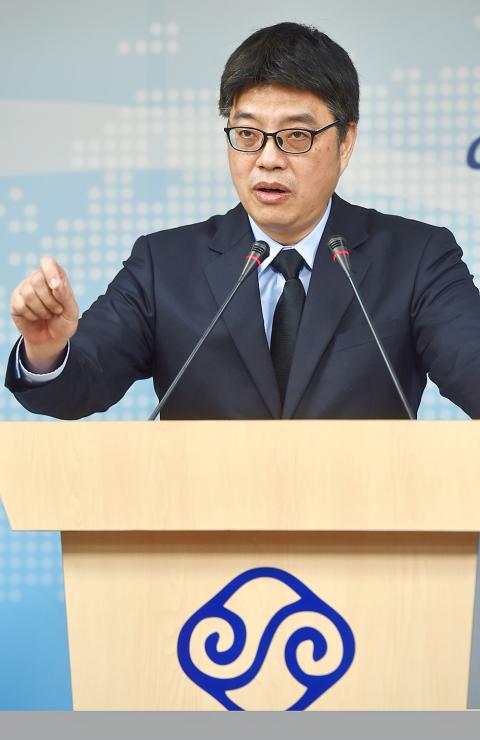Minister of Culture Cheng Li-chiun (鄭麗君) yesterday said the showing of a trailer for Chinese variety show Trust in China (信中國) in Taipei’s Ximending (西門町) on Tuesday broke the law.
The video clip, which was played on jumbo-sized displays in Taipei, Beijing, Hong Kong and New York City’s Times Square, features scores of celebrities reading letters by Chinese Communist Party members.
At a news conference after a Cabinet meeting, Cheng said that the broadcaster should have obtained approval from the Ministry of Culture and the Mainland Affairs Council (MAC) before airing the trailer, citing the Regulations for Advertising Goods, Labor and General Services of the Mainland Area in the Taiwan Area (大陸地區物品勞務服務在臺灣地區從事廣告活動管理辦法).

Photo: Chien Jung-fong, Taipei Times
“We have no record of ever having evaluated or approved the program,” she said.
The council is the agency charged with enforcing the regulations and the ministry would assist it in any legal action that is to follow, she added.
Executive Yuan spokesman Hsu Kuo-yung (徐國勇) said the advertisement had not been unauthorized and that the Cabinet would ask the council to deal with it according to the law.
Asked for comment, MAC Deputy Minister Chiu Chui-cheng (邱垂正) said the council had identified the advertising agency that aired the trailer, stopped the broadcasts and opened an inquiry.
Broadcasting or publishing political propaganda for the Chinese Communist Party is forbidden under Article 24 of the Act Governing Relations Between the People of the Taiwan Area and the Mainland Area (臺灣地區與大陸地區人民關係條例), Chiu said.
The advertising agency failed to apply for a permit to air the trailer, he added.
In related news, at an event to mark the opening of a park, Taipei Mayor Ko Wen-je (柯文哲) said it is impossible for the nation to ban all Chinese advertisements, adding that such activity should be allowed on the principle of “equality and respect.”
“By equality, I mean that if [China] wants to publish advertisements here, we [Taiwan] should also be allowed to publish advertisements in [China],” Ko said, adding that he “should look into it.”
Additional reporting by Shen Pei-yao

CHAOS: Iranians took to the streets playing celebratory music after reports of Khamenei’s death on Saturday, while mourners also gathered in Tehran yesterday Iranian Supreme Leader Ayatollah Ali Khamenei was killed in a major attack on Iran launched by Israel and the US, throwing the future of the Islamic republic into doubt and raising the risk of regional instability. Iranian state television and the state-run IRNA news agency announced the 86-year-old’s death early yesterday. US President Donald Trump said it gave Iranians their “greatest chance” to “take back” their country. The announcements came after a joint US and Israeli aerial bombardment that targeted Iranian military and governmental sites. Trump said the “heavy and pinpoint bombing” would continue through the week or as long

TRUST: The KMT said it respected the US’ timing and considerations, and hoped it would continue to honor its commitments to helping Taiwan bolster its defenses and deterrence US President Donald Trump is delaying a multibillion-dollar arms sale to Taiwan to ensure his visit to Beijing is successful, a New York Times report said. The weapons sales package has stalled in the US Department of State, the report said, citing US officials it did not identify. The White House has told agencies not to push forward ahead of Trump’s meeting with Chinese President Xi Jinping (習近平), it said. The two last month held a phone call to discuss trade and geopolitical flashpoints ahead of the summit. Xi raised the Taiwan issue and urged the US to handle arms sales to

State-run CPC Corp, Taiwan (CPC, 台灣中油) yesterday said that it had confirmed on Saturday night with its liquefied natural gas (LNG) and crude oil suppliers that shipments are proceeding as scheduled and that domestic supplies remain unaffected. The CPC yesterday announced the gasoline and diesel prices will rise by NT$0.2 and NT$0.4 per liter, respectively, starting Monday, citing Middle East tensions and blizzards in the eastern United States. CPC also iterated it has been reducing the proportion of crude oil imports from the Middle East and diversifying its supply sources in the past few years in response to geopolitical risks, expanding

Pro-democracy media tycoon Jimmy Lai’s (黎智英) fraud conviction and prison sentence were yesterday overturned by a Hong Kong court, in a surprise legal decision that comes soon after Lai was jailed for 20 years on a separate national security charge. Judges Jeremy Poon (潘兆初), Anthea Pang (彭寶琴) and Derek Pang (彭偉昌) said in the judgement that they allowed the appeal from Lai, and another defendant in the case, to proceed, as a lower court judge had “erred.” “The Court of Appeal gave them leave to appeal against their conviction, allowed their appeals, quashed the convictions and set aside the sentences,” the judges